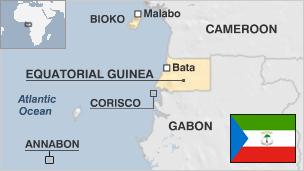-
23 January 2015
- From the section Africa

Equatorial Guinea is a small country on the west coast of Africa which struck oil in 1995 and which is now being cited as a textbook case of the resource curse – or the paradox of plenty.
It is made up of a mainland territory called Rio Muni, and five islands including Bioko, where the capital Malabo is located.
Since the mid 1990s the former Spanish colony has become one of sub-Sahara’s biggest oil producers and in 2004 was said to have the world’s fastest-growing economy.
Despite having the highest wealth ranking of any African country, a large proportion of the population still lives in poverty. According to the African Development Bank, while oil and gas revenues have led to improvements in basic infrastructure in recent years, there has been no significant improvement in living conditions for the population.
The government has increased spending on public works, but the UN says that less than half the population has access to clean drinking water and that nearly 10 percent of children die before reaching age five.
The country has exasperated a variety of rights organisations who have described the two post-independence leaders as among the worst abusers of human rights in Africa.
Francisco Macias Nguema’s reign of terror – from independence in 1968 until his overthrow in 1979 – prompted a third of the population to flee. Apart from allegedly committing genocide against the Bubi ethnic minority, he ordered the death of thousands of suspected opponents, closed down churches and presided over the economy’s collapse.
His successor – Teodoro Obiang Nguema Mbasogo – took over in a coup and has shown little tolerance for opposition during the three decades of his rule. While the country is nominally a multiparty democracy, elections have generally been considered a sham.
According to Human Rights Watch, the ”dictatorship under President Obiang has used an oil boom to entrench and enrich itself further at the expense of the country’s people”.
The corruption watchdog Transparency International has put Equatorial Guinea in the top 12 of its list of most corrupt states. In 2008 the country became a candidate of the Extractive Industries Transparency Initiative – an international project meant to promote openness about government oil revenues – but failed to qualify by an April 2010 deadline. It has since re-applied.
Investigations
A 2004 US Senate investigation into the Washington-based Riggs Bank found that President Obiang’s family had received huge payments from US oil companies such as Exxon Mobil and Amerada Hess.
Observers say the US finds it hard to criticise a country which is seen as an ally in a volatile, oil-rich region. In 2006, Secretary of State Condoleezza Rice hailed President Obiang as a “good friend” despite repeated criticism of his human rights and civil liberties record by her own department. More recently President Barack Obama posed for an official photograph with President Obiang at a New York reception.
In October 2014, President Obiang’s son Teodorin, a government minister, was forced to relinquish more than 30 million dollars of assets in the United States, which the authorities there say were bought with stolen money.
Equatorial Guinea hit the headlines in 2004 when a plane load of suspected mercenaries was intercepted in Zimbabwe while allegedly on the way to overthrow President Obiang.



